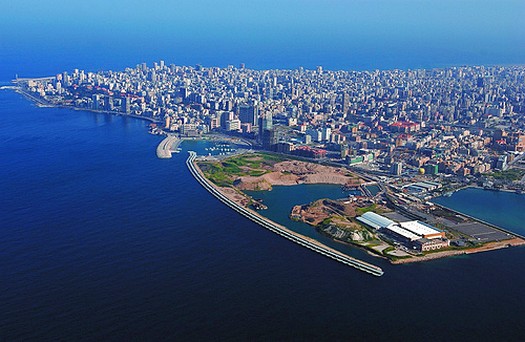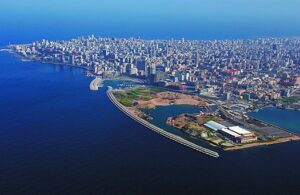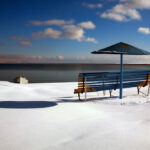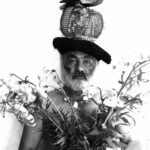
Previously we left Daniel becoming a ‘member of the Barmaksiz family’
FROM DANIEL’S DIARY
47- ‘I work in the bakery and sleep in the kitchen’.
‘During summer months, like the rest of the family, I slept in the yard, outdoors, but when winter came the rest of the family took to their bedroom and my “bed” was put on the floor of the kitchen.
Almost as soon as I was “adopted” I started working in the Barmaksiz bakery as an apprentice. Most of the time I had to stand on a flat stone to do my work because the worktables were all made for adults and I was only 7 years old. I performed all sorts of tasks in the bakery, I was (ambarkirasse), the person who weighs the different kinds of flour and pours them down to the basin in the right proportion to be mixed and changed to dough. I also worked as (tabdji), the person who flattens the ball of dough partially and turns it over to the journeyman who gives it its final form using his nails on it. Occasionally I was also (ghallédar) the cashier who is also the salesman’.
48- ‘I never get enough sleep’.
‘I had to go to the shop before daybreak, probably around 3 a.m., because I was entrusted with the key of the shop, and had to be the last to leave the shop. It was necessary for me to go early in the morning because that is when the (khamourkeh), the man who makes the dough had to go so that there might be time for the yeasting of the dough, before the other workers came at about 6 a.m.
So, I worked from 3 a.m. to about 10 p.m. 19 hours. I have never in my life slept so soundly as I did during the few hours that I had for that purpose, from 11 p.m. to 3 a.m.
My work was hard, as well as taking long hours. One of my duties was bringing water from the mosque, about 100 meters away from the shop. I carried water with a (tshateh), a stick attached to a string around my neck with two large cans hanging from the two ends of the stick. I could not carry two full cans but made them 3Ž4 full.’
 Some of the Armenians who escaped or survived the genocide and made their homes in other parts of the Middle East found themselves, several decades later, in more wars and upheavals. In Lebanon it was 15 years of civil war. In Iran, the Islamic Revolution. In Iraq, war and insurgencies for the last two decades and today Syria is a jumble of extremists tearing that beautiful country apart. I, for one, have vivid memories of the Lebanese Civil War. We suffered scarcity of food, water and petrol rations. People had to join long queues for basic food products especially bread. As a young child I was cushioned, by my parents, from the harsh realities of war to a certain extent but I will never forget having to escape from West Beirut in 1982 when the Israelis invaded Lebanon. The noise of the military planes was terrible. Day and night we were pounded with rockets. Even today when I hear the sound of fireworks my heart starts to race and I get very nervous. My mother who was alone at the time, as my father was working in Saudi Arabia, put us, my sister, brother and me, in a car, which took us to the ‘Green Line’ – a crossing point between Muslim West Beirut and Christian East Beirut. When our car arrived at the ‘Green Line’ my mother got us out and we each had to carry a suitcase and hurry across the no-man’s land to the safety of East Beirut. We didn’t look left or right as tracer bullets whizzed over our heads adding to the awful booming of rockets exploding. When we finally arrived on the Christian side of the Green Line we got into a car and relative safety. I remember the feeling of fear ebbing away slowly as the car drove north on the coast road while we watched rockets raining down on Beirut. In hindsight that was one moment for me but when I think of the generations of Armenians and Lebanese whose lives have been uprooted over and over again and I wonder what Daniel would have said had he lived to see his chosen country torn up over and over again for decades upon decades?
Some of the Armenians who escaped or survived the genocide and made their homes in other parts of the Middle East found themselves, several decades later, in more wars and upheavals. In Lebanon it was 15 years of civil war. In Iran, the Islamic Revolution. In Iraq, war and insurgencies for the last two decades and today Syria is a jumble of extremists tearing that beautiful country apart. I, for one, have vivid memories of the Lebanese Civil War. We suffered scarcity of food, water and petrol rations. People had to join long queues for basic food products especially bread. As a young child I was cushioned, by my parents, from the harsh realities of war to a certain extent but I will never forget having to escape from West Beirut in 1982 when the Israelis invaded Lebanon. The noise of the military planes was terrible. Day and night we were pounded with rockets. Even today when I hear the sound of fireworks my heart starts to race and I get very nervous. My mother who was alone at the time, as my father was working in Saudi Arabia, put us, my sister, brother and me, in a car, which took us to the ‘Green Line’ – a crossing point between Muslim West Beirut and Christian East Beirut. When our car arrived at the ‘Green Line’ my mother got us out and we each had to carry a suitcase and hurry across the no-man’s land to the safety of East Beirut. We didn’t look left or right as tracer bullets whizzed over our heads adding to the awful booming of rockets exploding. When we finally arrived on the Christian side of the Green Line we got into a car and relative safety. I remember the feeling of fear ebbing away slowly as the car drove north on the coast road while we watched rockets raining down on Beirut. In hindsight that was one moment for me but when I think of the generations of Armenians and Lebanese whose lives have been uprooted over and over again and I wonder what Daniel would have said had he lived to see his chosen country torn up over and over again for decades upon decades?
Some more from Daniel’s diary
49- ‘Complaints of my master “I feed my companions of the street”.
‘My master Barmaksiz Artin Ousta had two sons and a daughter, Artin, Mihran and Mary. Mary was engaged to be married, Mihran was away in the Turkish army and Artin Jr. was working with his father who was too old to run the shop alone. The town needed the younger Artin that is why he was allowed to remain at his job but just the same he had had to be (bedel) ransomed twice, and yet the police every now and then used to come and ask for him. Therefore he kept out of sight and his father had to give the police bribes every time they appeared. For this reason the father too tried to keep himself out of sight, posting me as the cashier and salesman.
I do not think I made mistakes in selling the bread, cashing and returning the change, because it was all petty cash. People came to buy 3,5 or 10 loaves, seldom more than that.
The main complaint from my master was what the other workers told him about me. Refugee boys with whom I had been in the streets of Aintab were now starving, so that when they came to me begging for bread I could not resist their requests. Bread was very expensive and my master was very very stingy. This was the principal complaint my master had against me and after I had been reported several times he hesitated to put me as cashier.’
TO BE CONTINUED..
Menak Parov..See you next Wednesday



0 Comments